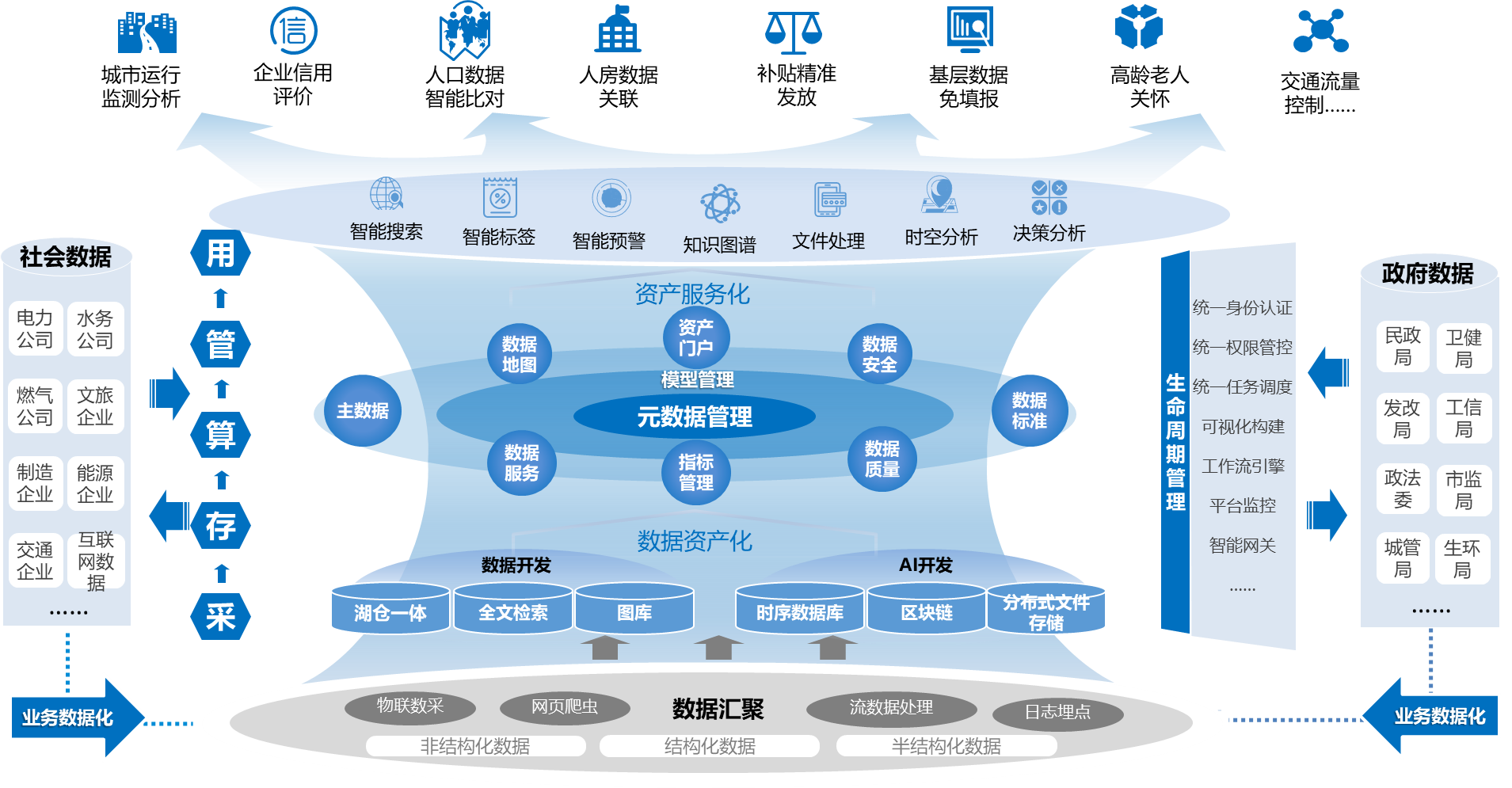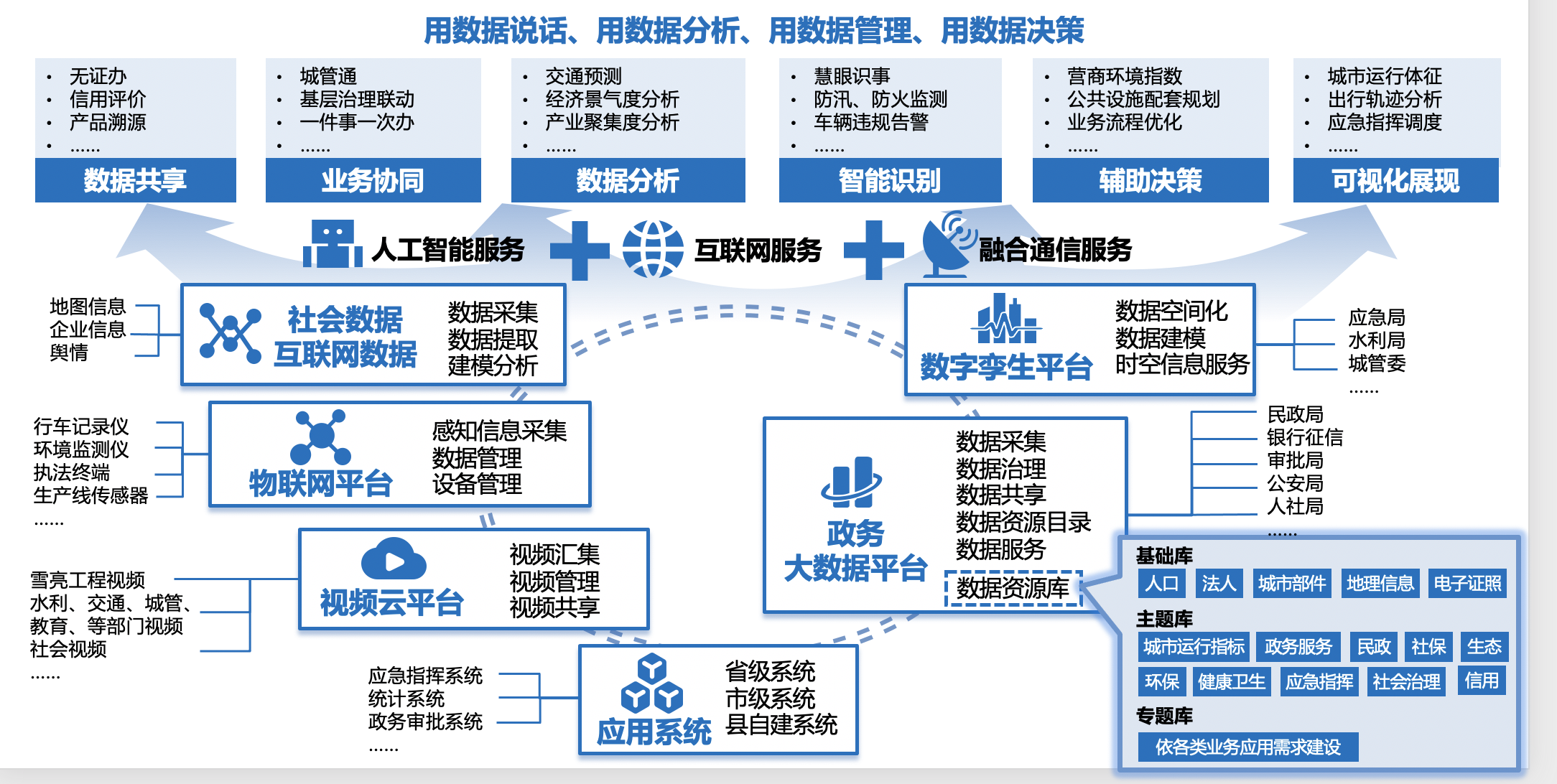

Digital Government and Smart Cities

As a core asset of smart cities and an important resource for social development, big data is a key factor driving the digital transformation of various industries. The data resources involved in the process of building a smart city come from all walks of life, and there are many types, such as government big data, video, perceived information, spatiotemporal information, Internet information, etc. In the face of multi-source and heterogeneous data resources, it is necessary to build an integrated urban big data platform to provide technical support for cross-domain, cross-department, and cross-business linkages at the city level, help all walks of life to digitize and upgrade, and form a new smart city operation mode characterized by thorough perception, rapid response, fine management, scientific decision-making, business linkage, and active service.

For unstructured data with exponential growth, a unified collection platform, storage center, management platform, and service interface are provided to ensure the availability, integrity, accuracy, and uniqueness of data through unified collection, management, and processing.
Provide corresponding management methods and quality control tools for data collection, storage, processing, sharing, application, and open life cycle, so that problem data can be fed back, the sharing process can be traced, and data quality can be evaluated.
3. Supporting the Convergence of Technology and Business Innovation
Fully consider the sharing and co-construction needs among government departments, social institutions, and citizens, support the smooth flow of information resources across departments, levels, systems, and regions, break down information barriers, and realize a new information-based development model of resource sharing, application platform, and service integration.

The City Big Data Platform is a comprehensive technology platform that realizes urban data assetization and asset servicification, and has the ability to cover the full life cycle management and services of data "collection, storage, calculation, management, and use". Through the Digital Intelligence Fusion Technology, the unstructured, real-time, offline and IoT-aware heterogeneous data from various government departments and public utilities, enterprises and other sources are rapidly fused to establish a high-quality data system for different industry sectors. At the same time, with the goal of business scenarios, combined with intelligent search, smart labels, knowledge graphs, and other technologies, the system can fully tap the value of data elements, effectively promote data sharing, development, and utilization across departments, and build a series of innovative application scenarios such as public data disclosure, intelligent comparison of people-accommodation data, urban operation monitoring and early warning, credit evaluation, supply chain collaborative manufacturing, etc., to form a business management model of "speaking with data, analyzing with data, managing with data, and making decisions with data".
Overall Architecture of the City Big Data Platform

The City Big Data Platform connects various data source systems such as the Internet of Things platform, digital twin platform, video cloud platform, and government service sharing and exchange platform to realize the unified collection, sharing, integration, and analysis of urban data resources, forming a city-level data management architecture to carry out high-quality management of the entire data life cycle. It fully taps the value of data resources, promotes data development and utilization, and realizes cross-department sharing, monitoring and early warning, visual display, analysis and decision-making.

Scenario 1: The application of government data sharing
In government affairs services, the platform reduces the materials citizens have to submit or complete by sharing various business data, improves the efficiency of window staff in handling government affairs, and improves the satisfaction of citizens or enterprises.
Scenario 2: City Operation Overview
The platform superimposes various key indicators on the city digital map and performs integration analysis by aggregating business system data, video data, Internet of Things data, spatio-temporal information data, etc. from various government departments to form a real-time and dynamic panorama of urban business to help managers visually grasp the city operation situation.
Scenario 3: Auxiliary Decision Analysis
The platform provides multi-dimensional and in-depth business analysis and auxiliary decision support for various departments by building algorithmic models and carrying out monitoring, planning, early warning, forecasting, and other analysis activities. Such as macroeconomic early warning analysis, industrial competitiveness assessment, GDP trend analysis, traffic operation analysis, migrating population analysis, policy sand table deduction, etc.

National Development and Reform Commission Smart Development and Reform Big Data Platform
Supreme People's Procuratorate Big Data Analysis Platform
Guangdong Provincial Higher People's Court Big Data Service Platform
Zhejiang Provincial Higher People's Court Intelligent Analysis Platform
Big Data Visualization Management Platform for Courts in Jiangsu Province
Guangdong Property Taxation Service Big Data Platform
Guangzhou Municipal Government Big Data Aggregation Management Platform
Changsha Wangcheng District Government Affairs Big Data Platform
Qinghai Transportation Holding Group Intelligent Data Middle Platform